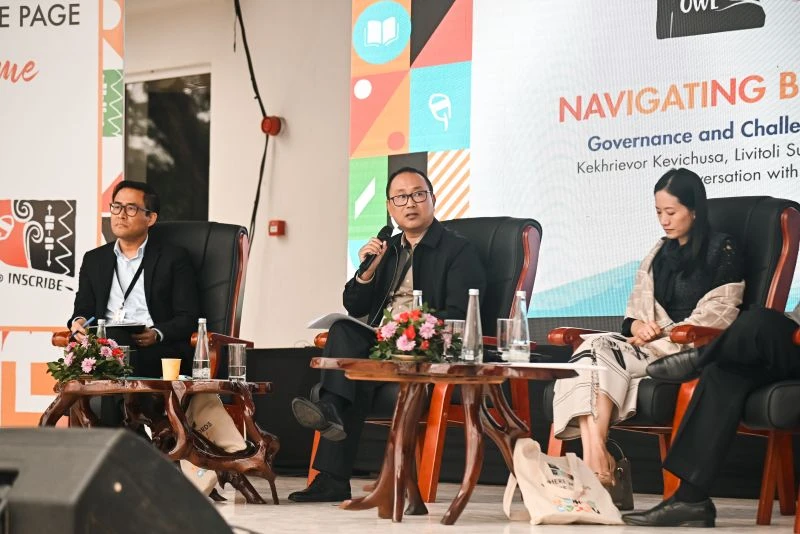Panelists discuss on the topic “Navigating Bureaucracy: Governance and Challenges in the Northeast” at the Penguin White Owl Literature Festival & Book Fair at Zone Niathu by The Park, Chümoukedima, on February 18.

Panel talk focuses on bureaucracy and its current state in Nagaland
Morung Express News
Dimapur | February 18
Oligarchy has generally come to be associated with the post-Soviet republics, Russia in particular; and in recent times, the USA, with the emergence of Elon Musk.
But according to a retired IAS officer, oligarchy may have happened in Nagaland a bit earlier than generally assumed by the west. “When people talk about oligarchy, they are probably talking about Russia. Now, they say it is headquartered in the USA. But actually, oligarchy may have started a little bit further ahead in time in Nagaland itself,” remarked former Chief Nagaland Chief Secretary, Alemtemshi Jamir at a panel talk on February 18, as a part of The White Owl Literature Festival & Book Fair 2025.
His comment alluded to what he termed as “money politics” or the rise of the nexus between money and electoral politics, suggesting an elitist or oligarchic system where governance benefits the wealthy.

Navigating Bureaucracy: Governance and Challenges in the Northeast was the topic given to the panel, which also included two serving bureaucrats— Kekhrievor Kevichusa and Livitoli Sukhalu. Kevichusa is an Indian Postal Service officer, currently on deputation to the Nagaland government in the Urban Development and Municipal Affairs Department. Sukhalu is a Nagaland Civil Service officer, currently posted in the Personnel and Administrative Reforms Department as Deputy Secretary.
Sashi Wapang Lanu, an officer of the Indian Revenue Service was the moderator, currently the Additional Commissioner, Central GST Commissionerate, Dimapur.
The panelists largely trained the focus on the history and current state of bureaucracy in Nagaland, highlighting both its challenges and potential.
Historically, Jamir said that the British colonial administration introduced an alien administrative system, hindering development post-independence. While stating that the legacy continues to influence Nagaland today, he held that the transition to parliamentary democracy and the Indo-Naga political issue served to further create confusion and lack of understanding of rules and regulations.
However, he added that building upon preexisting traditional governance institutions was one positive legacy of the colonial administrators, and further championed by post-independence administrators.
He suggested the concept of a “franchising government” by way of giving the freedom to competent individuals or bureaucrats to operate with more autonomy. He said that bureaucrats have to be “educated and enlightened” to break out of what he termed as “the role,” and need not necessarily come under the shadow of politicians.
Citing the growing potential of Nagaland's youth, he expressed confidence that with continued progress, the bureaucracy can evolve and improve.
Livitoli Sukhalu said that the bureaucratic system India inherited developed in a different context. “I think we are not only just learning how to navigate the inherited bureaucracy, but we are also learning how to adapt it to our requirements,” she said.
Stating that the public perception of governance in Nagaland is still evolving, she made anecdotal reference to how initially the Nagas associated government with individuals or the “white man” rather than institutions.
She said that Nagaland often compares itself to “mainland” India, overlooking the advantages of its less formalised traditional governance structures. She cited easier access to high-ranking officials as a positive aspect of the bureaucracy in Nagaland as opposed to in other states.
Kekhrievor Kevichus said that while the bureaucracy faces challenges stemming from its unique position in the Northeast, including ethnic diversity, geographical barriers and a perceived one-size-fits-all approach by the Union government, he said that the unresolved Indo-Naga political issue continues to be a convenient excuse for slow development. He identified some challenges specific to Nagaland's bureaucracy. They included lack of specialisation, inconsistent adherence to rules and lack of impersonality.
He said that specialists are not always recruited for specific jobs, while bureaucrats do not always act impersonally, as they should in an ideal bureaucracy. While a hierarchy exists, it is not always strictly adhered to, leading to delays. He added that guidelines are not consistently followed, potentially leading to a lack of uniformity and favoritism.
He called for increased transparency and accountability through public access to documents, social audits and citizen charters. Active citizen involvement not only through voting, but also engaging in public discussions can influence policy and improve government performance, he said.
Despite the challenges, he asserted that the bureaucracy in Nagaland is relatively accessible compared to other states, which is a positive.






